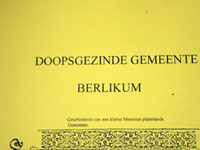 I am getting to know a wonderfully-alive Dutch man we’ll call Aert. Aert is a middle-aged school teacher who lives in the northern province of The Netherlands called Friesland.
I am getting to know a wonderfully-alive Dutch man we’ll call Aert. Aert is a middle-aged school teacher who lives in the northern province of The Netherlands called Friesland.
In a recent conversation using Skype—the Internet-based technology that turns your computer into a phone to make free calls around the world—I learned something from Aert that really caught my attention. When Aert talks with Dutch friends about church and religion, he communicates in Dutch or Frisian. But—in a nuanced contrast—to discuss matters of faith and spirituality, he needs to talk in English.
It turns out that Aert has all the language he needs to discuss how the church is a religion. But in his native land which is well into a phase of history that some call post-Christendom, it turns out he needs to flip into English to discuss the more dynamic concepts of spirituality and faith. Why? These latter terms are things he has been learning about from conversations with American Mennonites and it either doesn’t translate well into his native languages, or it’s so uncomfortable forcing his native languages into this “new†territory that he can’t bring himself to do it.
I’ve been thinking about what this may mean for me in my little Mennonite world here in Pennsylvania. What impact might this learning have about how Mennonite leaders are trying to have a discussion about being missional or intercultural? We can discuss about community and peace—even when we don’t practice them very well, but try talking about missional or intercultural (or especially antiracism) and folks respond like we’re talking different languages—and perhaps we are.
 All of this makes me want to learn more languages, and it also inspires me to learn how to live what I speak. I have a long way to go….
All of this makes me want to learn more languages, and it also inspires me to learn how to live what I speak. I have a long way to go….
The opinions expressed in articles posted on Mosaic’s website are those of the author and may not reflect the official policy of Mosaic Conference. Mosaic is a large conference, crossing ethnicities, geographies, generations, theologies, and politics. Each person can only speak for themselves; no one can represent “the conference.” May God give us the grace to hear what the Spirit is speaking to us through people with whom we disagree and the humility and courage to love one another even when those disagreements can’t be bridged.

I am becoming ever more aware of how well intended language can be and how incomplete it yet remains. As I think of the Christians I find most impressive it often has everything to do with how the practice of their faith goes. And what stood out the most to me on my recent trip to the UK was how winsomely it was practiced in a place where the language of faith is becoming less comprehensible.